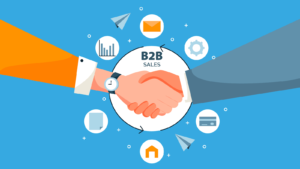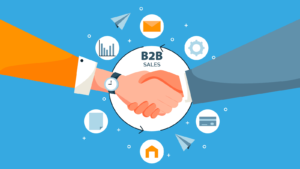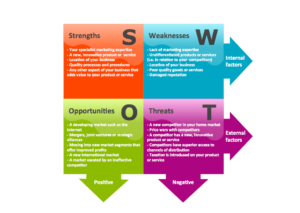What is B2B Sales?
Business-to-business describes a relationship, situation, or marketplace between one business entity and another. Read the full article and get complete knowledge about B2B Sales.
Common examples of B2B sales include:
- Organizations that provide professional services (e.g., market research) to companies
- Businesses that provide digital/software services (e.g., CRM) to companies
- Companies that produce/distribute raw materials to manufacturing companies

B2B SALES GRAPHIC IMAGE
Sales and Revenue
B2B sales refers to a sales model or a category of selling wherein a business sells its products or services to another business. Because B2B sales usually involves higher price points, more complex processes, and several touchpoints over multiple channels, B2B companies need to maintain a team of highly-trained B2B sales professionals in order to drive revenue.
What is a B2B sales representative?
A sales representative is a professional who uses strategic sequences and specialized selling methods to engage corporate buyers. Because corporate buyers tends to research products and services online before contacting a salesperson, these buyers are often well-informed and are compared to several competing products at once.
Sales responsibility
B2B sales representatives are responsible for making and answering sales calls, managing sales emails, setting meetings, conducting product demos/presentations, building rapport, handling objections, identifying pain points, and solving problems.
Sales cycle
In cases where teams do not have account executives, B2B sales reps own virtually the entire sales cycle, engaging customers throughout the buyer journey — from prospecting and lead nurturing to closing deals.
Pitching
Product Pitching can be in the form of a presentation, product demonstration, or a combination of multiple methods. Pitching is one of the most crucial steps in converting a B2B prospect into a customer.
Handling objections
Savvy business buyers make decisions based on the value your company can add to theirs. Salespeople should use the qualification and research stages to anticipate questions prospects might ask. The better a salesperson can respond to questions and objections, the more confidence they can inspire in prospects.
Nurturing
Business to business sales are rarely one-off transactions. Most B2B sales are focused on getting repeat business. B2B salespeople need to maintain and nurture relationships with their clients even after deals are closed. This could involve following up with them on delivery of their purchased products and services, providing after-sales support, or simply checking in periodically for cross- and upsell opportunities.
What is the B2B sales process?
B2B selling is a complex process that requires a well-designed and executed B2B sales strategy in order to succeed. It follows a distinct process and uses a wide range of sales techniques for various buyer personals and selling situations. The exact number and names of stages in sales process will depend on your industry, company, and sales organization, but the B2B sales process is typically a 5- to 8-stage sales cycle.
Here is an example of 7-stage B2B sales cycle:
- Preparation/Research
- Prospecting
- Needs Assessment
- Presentation/Sales Pitch
- Negotiation/Handling Objections
- Closing
- Follow-up
What is a B2B sales channel?
In contrast to the B2B sales process which focuses on the seller’s perspective, the one entity to another sales channel corresponds to the buyer’s journey. The sales funnel often serves as a visualization of a prospect’s proximity or likelihood of making a purchase by identifying the cognitive or emotional phases the prospect undergoes in the buying process.
Most B2B sales funnels consist of 4 to 7 steps. Here is an example of a 7-step B2B sales funnel:
- Awareness
- Interest
- Decision
- Purchase
- Evaluation
- Delight/Dissatisfaction
- Repurchase
How do you make a B2B sale?
The Business to business sales approach involves several factors, including seller competency, sales process effectivity, product fit, available alternatives, and the buyer’s purchasing capability and willingness to adopt.
To make all these moving parts work together, businesses need to:
- Build a responsive B2B sales strategy
- Determine the best B2B sales techniques for their teams and ideal customers
- Create well-calibrated playbooks and sequences for their sales reps to follow
- Measure and improve performance
To make all these moving parts work together, businesses need to:
- Build a responsive B2B sales strategy
- Determine the best B2B sales techniques for their teams and ideal customers
- Create well-balanced playbooks and sequences for their sales representative to follow
- Measure and improve performance
B2B Sales Techniques
There is an overwhelming number of B2B sales methodologies and frameworks to choose from. While they all claim to be effective, not all will fit your business, your sales organization, or your target customers. Some methods might work well for a specific industry but not others, while other methods succeed only if they fit the type of customer accounts in your portfolio.
Some of the more popular B2B sales techniques and methodologies include:
- Solution Selling
- The Challenger Sale
- Account-Based Sales
- Value Selling
- The Shoemaker Selling system
Methodology
To determine whether a B2B sales technique or a specific sales sequence positively impacts a business, sales organizations identify and measure key performance indicators. KPI’s are agreed-upon barometers used in assessing a sales performance in different areas such as profitability, sustainability, efficiency. They are also used to discover trends and to evaluate the productivity and performance of individual sellers.
Reference
https://www.outreach.io/blog/what-is-b2b-sales-definition-process-and-techniques












Do you mind if I quote a couple of your articles as long asI provide credit and sources back to your website?My blog site is in the very same niche as yours and my users would certainly benefit from some of the information you present here.Please let me know if this okay with you. Thanks!
Thanks for sharing. I read many of your blog posts, cool, your blog is very good.
I may need your help. I tried many ways but couldn’t solve it, but after reading your article, I think you have a way to help me. I’m looking forward for your reply. Thanks.
NAEgZsuD